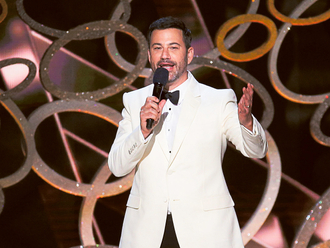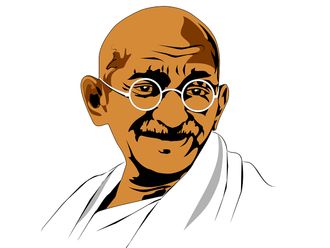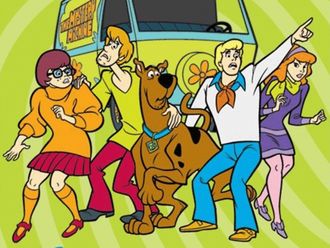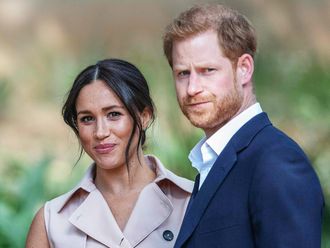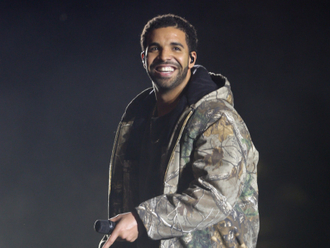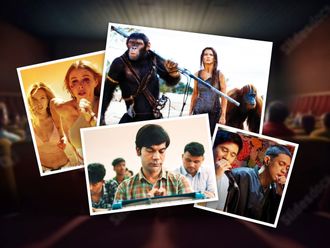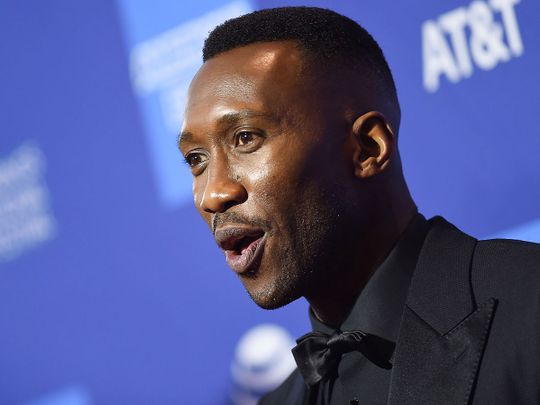
Exactly two years ago, in early 2017, the actor Mahershala Ali and his wife were about to give birth — one after the other. “It’s something we still joke about,” says the 44-year-old American, sitting in a London hotel, smiling at the memory. “My wife was pregnant with a baby. And I was pregnant with an Oscar.”
The actor knows that sounds glib. He knows that however exciting or worked-for an industry prize — Ali won his best supporting actor award that year for a standout performance in the coming-of-age drama ‘Moonlight’ — nothing compares to the craft of bearing an actual child. But aspects of the comparison stand. There’s a lot of build-up and then things go crazy all at once. Taking home a newborn, like taking home an Oscar, turns life on its head. And forget about sleep. Ali’s wife, the artist Amatus Sami-Karim, gave birth to their daughter, Bari, that February, and 100 frazzled hours later Ali was on stage at the Dolby Theatre in Hollywood, looking blinky and delighted, and bringing an audience of grandees to their feet when he croaked: “I just wanna thank my wife.”
It was a week that changed everything for Ali. Until then he’d been an auxiliary guy, a well-thought-of actor who didn’t often get his name on the posters and who was probably best known for his regular appearances in Netflix’s ‘House Of Cards’. Ali had a fun if slightly underwritten role as the Washington fixer Remy Danton, a job he quit when the show was at its peak — wanting to take one last shot at becoming a leading actor before it was too late. ‘Moonlight’, in which he was a taciturn drug dealer, a character who appeared only fleetingly but whose presence hung over the whole movie, suggested Ali had the chops for lead roles. The Oscar win in 2017 pushed him over the top, and in the two years since then Ali has juggled parenthood with work on two huge new productions due out this month — the third season of HBO’s prestige procedural True Detective and the awards- tipped biopic Green Book, about the pioneering African American pianist Don Shirley.
I want to talk to Ali about ‘Green Book’, a rich and affecting film which last week won best comedy or musical at the Golden Globes; Ali picked up the award for best supporting actor. But first, I’m curious to know what happened next in the Ali family home, when a newborn and an Oscar came home within hours of each other.
He considers his answer carefully. The actor is an observant Muslim, a thoughtful guy who speaks in long, unhurried sentences. Combined with today’s outfit — a navy blue kimono-like gown, buttoned to the throat — it projects a potent sense of spiritual calm. Ali says that having the baby and the Oscar “was like a jigsaw puzzle which my wife and I had to try to put together. And as soon as we felt like we’d figured it out, it changed. It took a lot of listening to each other. Reacting. Every now and then we had to hit a tuning fork, to make sure we were in sync.”
Throughout a 10-month shoot on ‘True Detective’, Ali’s wife and daughter travelled from the family home in Los Angeles to the set in Arkansas as often as possible. After that, he was straight on to ‘Green Book’, which was based in New Orleans, and here the young family were able to snatch some life together between days on set. And after that? Ali says he just stopped saying yes to jobs. His wife needed time for her own career as an artist. The couple hit the tuning fork — and the tuning fork said it was blatantly her turn. They moved back to Los Angeles. “You get to the point where you think: ‘If I were to accept the next thing I’d be throwing off the balance of my family.’”
Ali talks a lot about balance. Central to the appeal of playing Don Shirley in ‘Green Book’ was that here was a historical figure all out of whack, a man blessed with enormous musical talent but with no clear place in the world he inhabited. Shirley rose to prominence in New York in the 1960s, becoming such a fixture at Carnegie Hall that he ended up living in a grand apartment above the main auditorium. “The more he had, the more he attained,” Ali says. “He still couldn’t get away from his isolated existence, because he was sort of a man beyond his time. You think about the Michael Jacksons of the world, the Princes, people so exceptional and extraordinary they almost have alien status.
“So many times, in my life, just living in New York City for a good bit of time... You’re walking on the street a lot, you’re on public transportation, you’re travelling late at night. And I remember I was always really conscious of how I dressed. Like, I wouldn’t wear clothes that allowed people to identify me with what I would think they would view as the typical black man. I wouldn’t wear tennis shoes. It was a conscious thing, because I found that women would cross the street [to avoid me], day or night. Or turn their ring over on the subway — turn the diamond inward! These were little things I would catch all the time.”
Ali continues: “How people would react to a large, fairly muscular, dark-skinned black man — I would be so conscious of it and it would upset me. It would affect my energy for the rest of the day. So in order to protect myself from having to manage other people’s fear, I would do things to pre-empt that. And so many black people around the world do this. Because there’s an idea that we’re something to be feared, or that we pose a danger.”
Shirley’s forced smile in the movie? That’s normal, Ali suggests: that’s textbook. “That’s just part of the tactics of a black person navigating a world that doesn’t know how to react. You develop this habit of addressing a situation by communicating how safe you are.”
The actor puts out his hands in a helpless gesture: it is what it is, “the double consciousness that black people carry with them”.
Finding Islam
Ali’s mother, Willicia, was the daughter of a Christian minister, and later became one herself. She picked her son’s name — Mahershalalhashbaz in full — out of the Bible. Mother and son lived in the Bay Area of California in what Ali describes as a “prayerful home”. His father, Phillip, was around for a few years, until he left the family in unusual circumstances. An amateur dancer, he was invited, in the late 1970s, to appear on a TV talent contest called ‘Soul Train’. He won, came home with a sports car, and then one day moved across America to try to get work in the theatre in New York. They cannot have seen each other often, because the actor once said he could count on 10 fingers the number of times the two of them were together. “But I always really respected and admired what my dad was doing,” he tells me.
Ali grew up close to his mother until he was in his early 20s, at which point there was a difficult breach over religion. “We lost a lot of years. Being in a relationship with God through Christianity had carried me for a period of time,” he remembers. “And then I felt like I needed to understand something deeper. So I went through a process of digging through different religions and philosophies, and ways of connecting to God. And that ended up being Islam for me.”
He converted at the start of 2000, changing his name from Gilmore to Ali. His mother was upset and many of his friends were politely confused. But on the whole, Ali recalls, “it didn’t necessarily seem that deep a thing to do. And then 9/11 happened.”
Moving through airports became difficult. After a few years of being taken aside at security gates, Ali learnt that his name was on a watch list for air travel. Meanwhile, his wife, also a practising Muslim, had stopped wearing a headscarf on city streets: too much grief.
Moonlight
The SAG ceremony took place in January 2017, at the end of a difficult weekend. President Trump had just unveiled the policy that became known as his “Muslim travel ban”. Ali had a lot going on in his life (the baby was due, the Oscar was due) and he could have been forgiven for ignoring the politics of the moment.
When he won, Ali wound up telling a story about his mother. Tender, as personal as it was political, the speech has since been viewed hundreds of thousands of times online. “My mother is an ordained minister,” Ali said: “I’m a Muslim. She didn’t do backflips when I called her to tell her I’d converted 17 years ago. But I tell you now, you put things to the side [and] I’m able to see her, she’s able to see me, and we love each other.”
His was one of the first Muslim-American voices the country heard that weekend, certainly from within the arts, and it was a powerful moment. Talking softly from the podium about the particular pain of persecution that comes from within one’s own community, Ali’s voice cracked as he said: “I hope that we do a better job.”
Two years on, it isn’t clear we are doing a better job. The US is full of renewed talk of a border wall. Europe is racking itself over Brexit. The #MeToo and Black Lives Matter movements have helped expose even graver social ills than were previously acknowledged. I ask Ali: if he were to get back up on a winner’s podium with this new film, would he speak to the political moment again?
Characteristically, he takes a moment to consider this. He doesn’t say yes, he doesn’t say no. His daughter, born in Oscars week, is now two years old and Ali offers up a lesson he’s learnt from parenting her. “It’s not like you get to say to them, ‘Hey! Don’t touch that hot stove!’ And then they never touch the stove again. You’ve got to keep drilling the message, right? You’ve got to carry on the conversation until they grow into a state of consciousness where they understand.”
So we’re only at the beginning, Ali thinks. “It’s a conversation that’s gonna go on for a while yet.”



